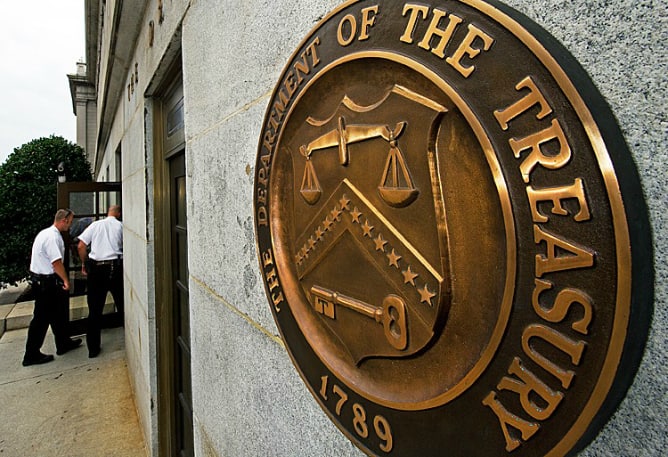After this Saturday was signed in the capital of Mexico the Second Partial Agreement for the Protection of the Venezuelan People by the Delegation of the Bolivarian Republic of Venezuela and the most radical sector of the opposition in the country, it transpired that the United States Government almost immediately issued an extended license that allows Chevron Corp to import oil or oil products from its companies in Venezuela.
According to a copy that circulated in networks of the license that the US Department of the Treasury, through the Office of Control of Foreign Assets (Ofac for its acronym in English), for the US transnational to operate again in Venezuela, that office issued “authorization of certain transactions related to the joint ventures of Chevron Corporation in Venezuela” for “all transactions normally incidental and necessary for the operation and administration by Chevron Corporation or its subsidiaries (“Chevron”) of Chevron’s joint ventures in Venezuela (collectively, the “Chevron JVs”) involving Petróleos de Venezuela, SA (PDVSA) or any entity in which PDVSA owns , directly or indirectly, a participation of 50 percent or more” that were “prohibited by Executive Order (EO) 13850” and its subsequent modifications by EO 13857 or 13884, which make up part of the unilateral coercive measures that block Venezuela .
License 41 would allow the “production and extraction of petroleum or petroleum products produced by Chevron JVs, and any related maintenance, repair, or service of Chevron JVs,” the text reads.
It also allows the “sale, export, or import into the US of oil or petroleum products produced by Chevron joint ventures, provided that the oil and petroleum products produced by Chevron joint ventures are first sold to Chevron” and the “purchase and import into Venezuela of goods or inputs related to the activities” of Chevron’s oil business “including diluents, condensates, oil or natural gas products.”
This immediate reaction from Washington makes clear the subordination of the most violent sector of the opposition in Venezuela to the orders of the White House, as has been denounced by the Government of President Nicolás Maduro and the rest of the Venezuelan State since the beginning of the coup d’état. continued that so much damage has been caused to the Bolivarian nation.
The controversy of the prohibitions
After the issuance of the document, a controversy derived from paragraph b that presents the limitations in the scope of the license to Chevron was presented in networks. The matter referred to a prohibition for the US company to pay taxes and royalties to the Bolivarian Government and that clause produced the comments that the authorization did not mean the entry of dividends into the country for the oil exploitation of the transnational, however said “prohibition” It is for the US company and whoever operates in the country is, as it says in the first paragraphs of the license, “the Chevron joint ventures in Venezuela (collectively, the “Chevron JVs”).”
In other words, the paragraph that indicates how OFAC “does not authorize: (1) The payment of any tax or royalties to the Government of Venezuela; (2) The payment of any dividend, including a dividend in kind, to PdVSA, or to any entity in which PdVSA owns, directly or indirectly, a participation of 50 percent or more.” It would represent a bizarre formality in the document issued by the US Treasury, because Chevron Corporation is not the one who should pay the taxes and/or royalties to the Venezuelan Government, but the Chevron JV referred to in the license.
The third prohibition that is read in the license does directly affect the group of joint ventures founded between the American transnational Chevron Corporation and the Venezuelan State PDVSA and prohibits “The sale of oil or oil products produced by or through Chevron’s JVs for export to any jurisdiction other than the United States”, which seems logical given the imperative need of the US to receive Venezuelan oil to face the energy crisis that forced it to use billions of barrels from its strategic reserves , this with the aim of stopping the excessive rise in fuel prices in the US that drive the already unprecedented inflationary spiral that recently touched records not seen in half a century.
They fear benefiting Iran and Russia
Consistent with the openly declared economic, commercial, and energy war against Russia and Iran, the license also prohibits “American persons, wherever located… from engaging in any transaction or negotiation in or relating to goods or services of Iranian origin, including the purchase or import of diluents and condensates of Iranian origin. oil or natural gas,” plus “any transaction involving an entity located in Venezuela that is owned or controlled by an entity located in the Russian Federation.”
Such clauses seem to try to avoid the boomerang effect that the European blockade had on Russian energy companies, especially driven by pressure from Washington due to the war in Ukraine, which ended up making oil more expensive throughout the world and forced Europe to buy the same Russian hydrocarbon. but at a higher price, and through third countries, as in the case of India, and soon through the Turkish market, according to what emerges from recent conversations between Moscow and Ankara.
It lasts six months, to begin with.
“This authorization is automatically renewed on the first day of each month and is valid for a period of six months from the effective date of General License No. 41 or the date of any subsequent renewal of General License No. 41, whatever is later,” reads the license issued today by OFAC, which could be interpreted as a long-term vision for Chevron’s renewed operation in Venezuela.
After this action, it is worth asking how long it will take for the rest of the oil transnationals with interests in Venezuela and that have not been able to operate in the world’s main oil reserve, to demand to have the rights renewed by Ofac for Chevron, since the only reason that they had to abandon all their operations was the implementation of illegal unilateral coercive measures from Washington to bring about a collapse in the country and promote a coup d’état, plans that are perceived as failed now that the most violent sector of the opposition in Venezuela are sitting at the negotiating table.








